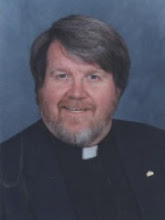 A familiar face in the American story, often more associated with his January birthday / holiday or the February Black History Month coverage, King comes to us this week as a Lenten martyr as he was assassinated on April 4, 1968.
A familiar face in the American story, often more associated with his January birthday / holiday or the February Black History Month coverage, King comes to us this week as a Lenten martyr as he was assassinated on April 4, 1968. He grew up in the segregated South of Atlanta -- he even sang with his Sunday School class for the Atlanta premiere of "Gone with the Wind"! Like his father and grandfather, King attended Morehouse College in Atlanta, but then he headed North to Crozer Seminary in Pennsylvania and graduate study in Boston (where he met Coretta Scott, his soon-to-be-bride). His grandfather and father both served at Ebenezer Baptist Church of Atlanta and he joined the staff 1960-1968, but he is more famous for his first call in 1954 to the Dexter Avenue Baptist Church in Montgomery and his leadership in the subsequent Montgomery Bus Boycott. He became a recognized face in the Civil Rights movement, becoming the youngest recipient (age 35) of the Nobel Peace Prize in 1964; he then witnessed passage of the Civil Rights Act of 1964 and the Voting Rights Act of 1965. His attention then turned to anti-war efforts and an anti-poverty campaign as well.
He was in Memphis, Tennessee, for challenges to the treatment of garbage workers, when he gave his famous "I've Been to the Mountaintop" address, concluding: “We've got some difficult days ahead. But it doesn't matter with me now. Because I've been to the mountaintop. And I don't mind. Like anybody, I would like to live a long life. Longevity has its place. But I'm not concerned about that now. I just want to do God's will. And He's allowed me to go up to the mountain. And I've looked over. And I've seen the promised land. I may not get there with you. But I want you to know tonight, that we, as a people, will get to the promised land. And I'm happy, tonight. I'm not worried about anything. I'm not fearing any man. Mine eyes have seen the glory of the coming of the Lord.”
The following evening, while standing on the balcony of his motel room in Memphis, he was assassinated.
King's "Mountain Top" speech is a stirring personal moment, yet he is probably best know n for his 1963 "Letter from a Birmingham Jail," addressed to clergy in America, but addressed, I believe, to all well-meaning people in America.
Just a sampling:
"I am in Birmingham because injustice is here. Just as the prophets of the eighth century B.C. left their villages and carried their 'thus saith the Lord' far beyond the boundaries of their home towns, and just as the Apostle Paul left his village of Tarsus and carried the gospel of Jesus Christ to the far corners of the Greco Roman world, so am I compelled to carry the gospel of freedom beyond my own home town. Like Paul, I must constantly respond to the Macedonian call for aid.
Moreover, I am cognizant of the interrelatedness of all communities and states. I cannot sit idly by in Atlanta and not be concerned about what happens in Birmingham. Injustice anywhere is a threat to justice everywhere. We are caught in an inescapable network of mutuality, tied in a single garment of destiny. Whatever affects one directly, affects all indirectly. Never again can we afford to live with the narrow, provincial "outside agitator" idea. Anyone who lives inside the United States can never be considered an outsider anywhere within its bounds."
"You may well ask: 'Why direct action? Why sit ins, marches and so forth? Isn't negotiation a better path?' … Nonviolent direct action seeks to create such a crisis and foster such a tension that a community which has constantly refused to negotiate is forced to confront the issue. It seeks so to dramatize the issue that it can no longer be ignored. … The purpose of our direct action program is to create a situation so crisis packed that it will inevitably open the door to negotiation. ...
We know through painful experience that freedom is never voluntarily given by the oppressor; it must be demanded by the oppressed. ... For years now I have heard the word 'Wait!' It rings in the ear of every Negro with piercing familiarity. This 'Wait' has almost always meant 'Never.' We must come to see, with one of our distinguished jurists, that 'justice too long delayed is justice denied.'"
"... In the midst of a mighty struggle to rid our nation of racial and economic injustice, I have heard many ministers say: 'Those are social issues, with which the gospel has no real concern.' And I have watched many churches commit themselves to a completely other worldly religion which makes a strange, un-Biblical distinction between body and soul, between the sacred and the secular.
... But the judgment of God is upon the church as never before. If today's church does not recapture the sacrificial spirit of the early church, it will lose its authenticity, forfeit the loyalty of millions, and be dismissed as an irrelevant social club with no meaning for the twentieth century. Every day I meet young people whose disappointment with the church has turned into outright disgust."
[My note: That last bit is a chilling word for a church which indeed finds itself in decline in America in the early 21st century!]
Thanks latter-day Brother Martin!





No comments:
Post a Comment